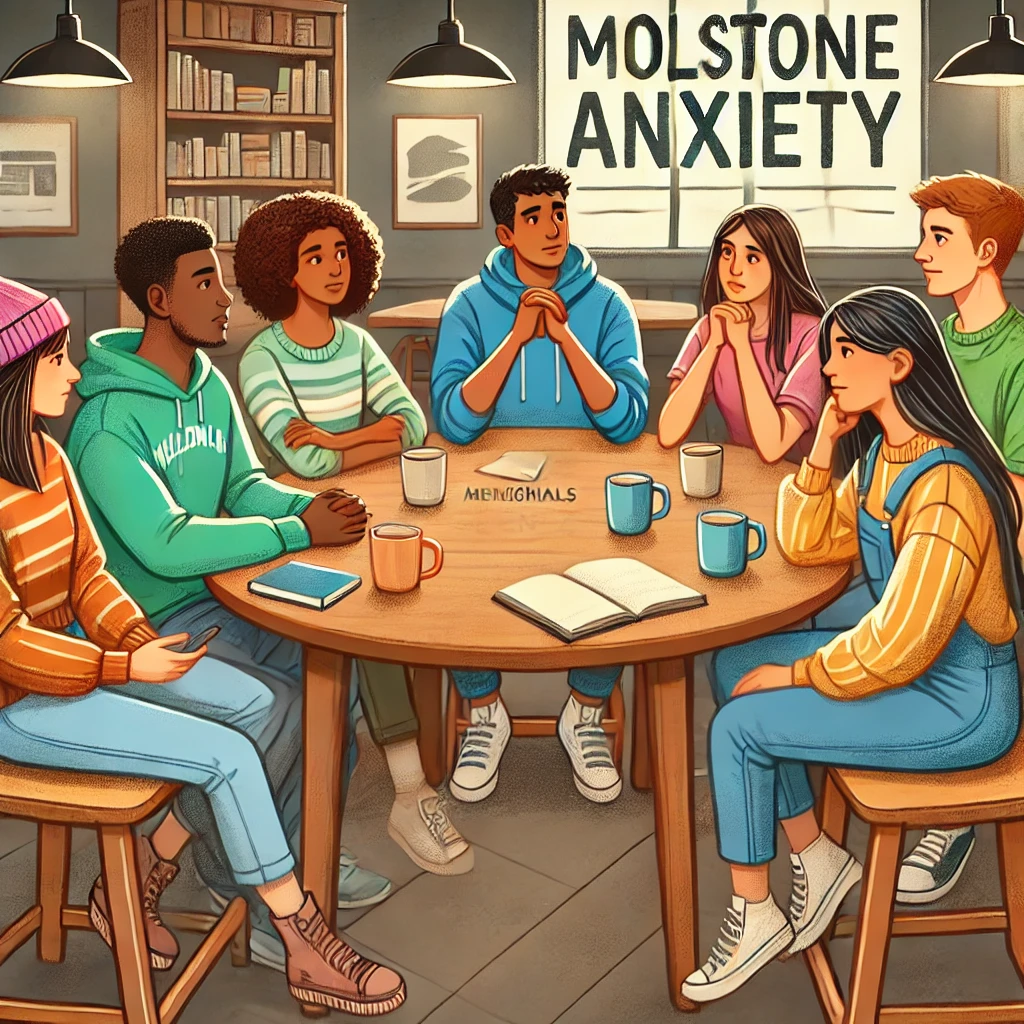Eventually, the group settles, orders something. The chat shifts from the small moments in everyone’s life to the bigger events: new houses, new careers, new family members.
There it is, that sudden tightness in your chest. You shift in your seat, touch your cheeks with the back of your hand. You knew this would happen, yet you still feel helpless.
Familiar scene? You’re not alone. Milestone anxiety is on the rise, especially among Millenials and Gen Zers. But what is milestone anxiety? How do you recognise its symptoms? And what steps can you take to ease its influence?
Let’s explore.
Milestone Anxiety: a definition
Collectively, we understand anxiety as an emotion marked by worrying, tense feelings, and physical changes like increased blood pressure. We often pair anxiety with fear, and often we use the terms interchangeably. But there’s a distinct difference.
Fear is seeing a fin in the water when you’re surfing; it’s immediate, short-lived, rational, and appropriate. You catch your next wave to the shore. Anxiety creeps up on you, and then hangs around. It nags, never quite goes away.
It’s all in the name. Milestone Anxiety is staring at your bedroom ceiling at 3 am, making and remaking a list in your head of all the things you have to do without if you’re ever going to save that house deposit. And it doesn’t discriminate. Anything you consider a milestone—or think you should consider a milestone—can be infected by this emotion.
Social context: where and when does Milestone Anxiety appear?
As with any other type of anxiety, milestone anxiety will turn up when it wants and won’t apologize, thank you very much. You only need the briefest reminder of a milestone for it to start knocking incessantly at the front door in your mind. And most times, it’ll outstay its welcome. A ten-second TV ad about nappies might consume your thoughts for an entire afternoon.
An external trigger—the story above—will do it, and so will an internal trigger. The reason is simple: milestones often involve planning. A lot of planning. That house deposit won’t save itself. And it’s vital that you dedicate time and effort toward your milestones. Unfortunately, these occasions often prove the ideal environment for milestone anxiety to flourish.
Parting the clouds: ways to reduce Milestone Anxiety
It’s natural to feel some anxiety toward your milestones; they’re pivotal moments in your life. If you feel the clouds gather far too often around them, then it’s worth taking steps to reduce the effect milestone anxiety can have on your mental health.
Get to know yourself
Of course I know myself, you think. How could I not? A fair question, and a fair assumption. You’d be surprised, especially when it comes to milestones. Taking a moment and gently interrogating yourself on the matter can work wonders.
It’s a simple question: what are my milestones? You might find buying your first home isn’t, in fact, a milestone of yours; it’s your siblings, or your best friend’s. A summer spent exploring Europe? That’s more like it. The better you recognise the milestones you actually want to reach, the better placed you are to reduce the energy you waste feeling anxious about events or achievements you could care less about.
Back to your siblings and your best friend. There’s nothing to gain from comparing yourself to others, there really isn’t. Of course, social media lets us peek over the entire world’s fence, whenever we please. Social media is performative, and it’s important to remember this.
Write down everything
When you work out what your milestones are—or should be—write them down. Finish this article and go buy yourself a journal. Yes, you can keep one online, but there’s something sacred and wonderful about keeping a journal the old-school way.
Now for the discipline. Anytime you feel milestone anxiety tugging your shirt collar, write down everything. Describe the moment as best you can, if you can. Your friends may raise eyebrows if you whip out your journal at lunch; if that’s the case, just remember to write it down later.
The more you do this, the better you’ll notice the approaching clouds and can take measures to blow them away. A key pillar of improving your mental health and wellbeing is awareness; keeping a journal is a proven way to become more aware.
Talk
We know. Easier said than done. Having the strength to talk about your milestone anxiety is often the first positive step toward addressing it. So, talk with your family, talk with your friends. Talk with the colleague that sits across from you at work, if you feel comfortable.
If mom’s advice proves no match for your anxiety, speak to a professional; counseling for millennials and Gen Zers is becoming more and more popular as the outdated stimga around therapy fades. Once you get over the hurdle of booking an appointment, you can focus on getting the most out of it. Therapy can be transformative. Your therapist will give you tools to address any level of anxiety, and any type. At the very least, they’ll help you open the windows in your mind and let the breeze in.
Your anxiety is as unique as you. So are your milestones, despite appearances. Which means, it’ll likely be trial and error that helps you overcome it. Investing in its reduction can have a remarkably positive effect on your life, and can even help you better reach—and celebrate—those milestones.

















